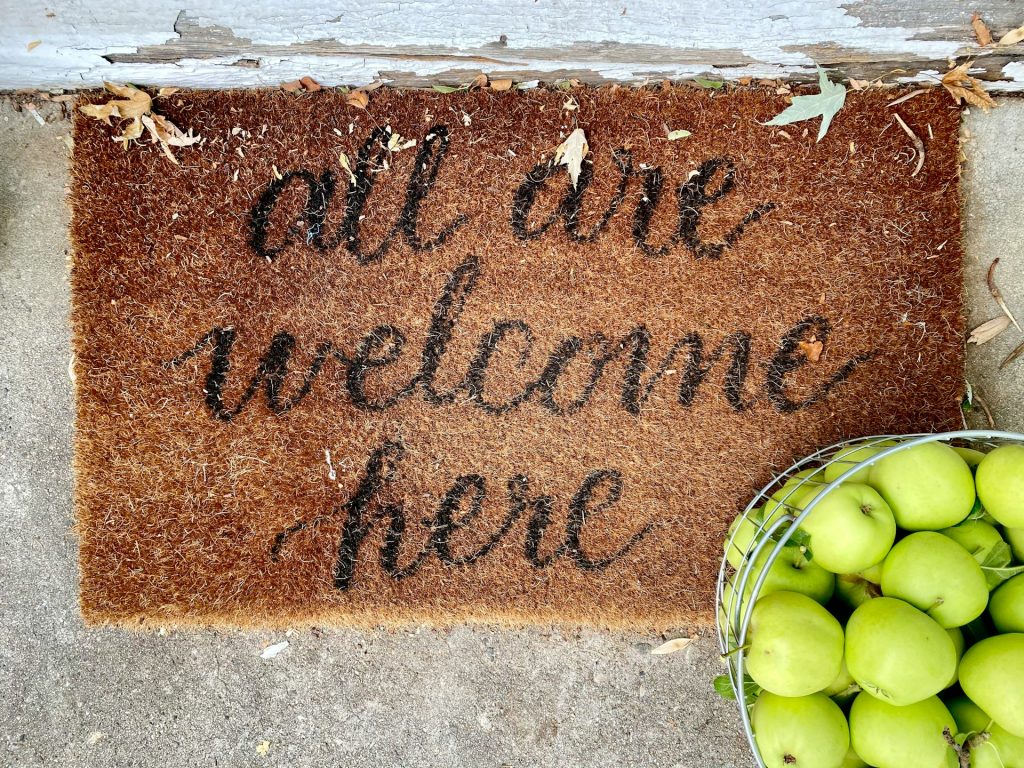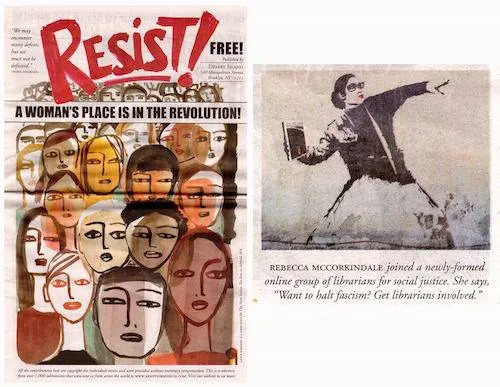
In our module on hyperlinked communities, we have examined themes and issues emerging in today’s libraries: technological tools and the digital divide, unique and alternative community-based services, and efforts to improve equity, diversity, and inclusivity in our spaces, programs, and collections. In exploring the latter, one article by Kelly Jensen, titled “Libraries Resist,” provides a summary of initiatives that some American libraries are undertaking to promote acceptance and freedom of expression in the face of external forces of prejudice and censorship.
One image in particular from this article has persisted in my mind–a Banksy-inspired poster of a woman ready to defiantly throw a book, bearing a quote: “Want to halt fascism? Get librarians involved.”

If only it were that easy. There is no room here to dissect the characteristics of fascism, or to form any intensive arguments of where fascist ideology is being exercised today, but it should be sufficient and uncontentious to say that some American libraries have, lately and frequently, been subject to censorship efforts, targeting books and programs which represent a number of marginalised groups.
Librarians cannot eliminate fascism or extinguish hate, but they can welcome marginalised groups and amplify their voices by collecting and promoting representational books, creating inclusive spaces and signage, offering welcoming and diverse programming, and resisting censorship pressures. There are countless examples of libraries enacting these strategies to promote equity; from LGBTQ+ book displays and Juneteenth programming, to programs aiding immigrants and fostering accessibility, libraries are positioned to help and give a voice to the discriminated and disenfranchised.
Libraries have long held mandates to serve their communities and to oppose censorship, and Michael Stephens’ conception of the modern hyperlinked library prescribes reaching “all users,” and remaining rooted in a “foundation of core ethics and values” (2016, p. 2). Librarians have a duty to make the library a safe and inclusive place for everyone in their communities, and should center their practice accordingly. Libraries can serve as bastions of hope and acceptance for the marginalised; as safe spaces in a perilous world.
I am fortunate to work in a Canadian academic library, and haven’t had to directly face hateful or exclusionary opposition, but being a part of an inclusive and welcoming library is something I take pride in. Libraries may not be able to stop fascism or discrimination, but being an inclusive and equitable space is something we should all strive for–and efforts to oppose and silence any library should be a cause for concern to us all.
References
Cline, L. (2020). Welcome [Photograph]. Unsplash. https://unsplash.com/photos/QKbbK46vtDI
Jensen, K. (2017, February 10). Libraries resist: A round-up of tolerance, social justice, & resistance in US libraries. Book Riot. https://bookriot.com/libraries-resist-round-tolerance-social-justice-resistance-us-libraries/
Stephens, M. (2016). The heart of librarianship: Attentive, positive, and purposeful change. ALA Editions.
3 responses to “Reflection: On Anti-Fascism in Libraries”
@colinmcleod I heart this: “Librarians cannot eliminate fascism or extinguish hate, but they can welcome marginalised groups and amplify their voices by collecting and promoting representational books, creating inclusive spaces and signage, offering welcoming and diverse programming, and resisting censorship pressures.”
You are right on target with that well worded statement. And I think we’re doing all of these things mostly to the best of our ability. It pains me when certain groups set their sites on libraries for programming such as drag queen story hour or for book challenges. Having policies in place that support all of the things you outlined above help counteract that.
@michael Thanks for your kind feedback. It is an unfortunate reality that these groups which seek to silence others aren’t going away any time soon. I think we all need to be mindful of the groups and watchful of their efforts.
@colinmcleod Agree. I continue to have high hopes that amidst all the awfulness, we will see a turn toward a more positive time as people get fed up with all of the anger and hate.